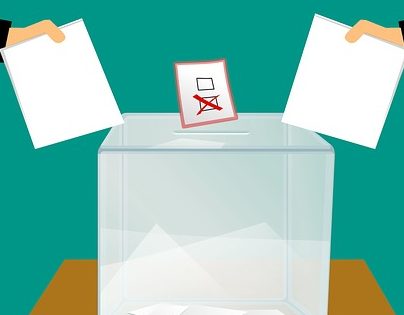Posts tagged Rick Allen

Labor secretary nominee defends ESG rule in tense House testimony
June 9, 2023 // Mr. Allen introduced a bill last year with Rep. Andy Barr, R-Ky., similar in scope to a rule finalized late in the Trump administration that said retirement plan fiduciaries could not invest in "non-pecuniary" vehicles that sacrifice investment returns or take on additional risk. Mr. Allen said he's working on reintroducing the bill during this Congress. Under the Biden administration, the Labor Department rescinded the Trump-era rule. On Tuesday, Ali Khawar, principal deputy assistant secretary of the Labor Department's Employee Benefits Security Administration, said the rule is neutral and doesn't require consideration of ESG factors when making an investment decision.

Why Congress Should Follow Tennessee’s Lead on Labor Reform
April 26, 2023 // And now, federal legislation aims to give them a similar guarantee. The Employee Rights Act, introduced by Sen. Tim Scott (R-S.C.) and Rep. Rick Allen (R-Ga.), envisions secret-ballot elections becoming the norm for almost all private-sector employees, in all states. It also secures workers’ privacy, giving them a choice about what information is shared with a union. For example, instead of workers having all their personal information—their cell phone number, their home address, and personal email—handed over to the union, workers can select a single piece of information to share. The legislation also modernizes outdated labor laws. With more than one-third of Americans now identifying as independent workers, this reform is sorely needed. The Employee Rights Act protects entrepreneurs by standardizing the federal definition of independent workers. This safeguards workers from being treated as employees for the purpose of unionization.
Employee Rights Act Is Back
April 25, 2023 //
What is the Employee Rights Act, and how would it advance worker freedom?
April 21, 2023 // Unlike the PRO Act – which, imbued with a dated and rigid workplace vision that is increasingly displacing American workers – the ERA would empower workers to seize more opportunity and take greater control of their futures.

The Undercover Organizers Behind America’s Union Wins
April 5, 2023 // The practice of joining a workplace with the secret aim of organizing it is called “salting.” Westlake was addressing recruits at the Inside Organizer School, a workshop held a couple times a year by a loose confederation of labor organizers. At these meetups, experienced activists train other attendees in the art of going undercover. Speakers lecture and lead discussions on how to pass employer screenings, forge relationships with co-workers and process the complicated feelings that can accompany a double life. Most salts are volunteers, not paid union officials, but unions sometimes fund their housing or, later, tap them for full-time jobs. Workers United, the Service Employees International Union affiliate that’s home to the new Starbucks union, hired Westlake as an organizer around the time the coffee chain fired him last fall.
Secret ballot vital in union elections
February 17, 2023 // Consider one example from the public sector. In 2018, the US Supreme Court ruled in Janus v. American Federation of State, County and Municipal Employees that public employees can’t be forced to join unions or pay union dues. The Commonwealth responded by passing legislation that allows public employee unions to agree to different terms for union members and non-members, giving unions the sole right to negotiate lesser pay and reduced benefits on behalf of the non-members. The law also promotes tried and true intimidation tactics by giving unions access to employees’ personal information, including home addresses; work, home, and personal cellphone numbers; along with work and personal email addresses. Anyone in Massachusetts public policy circles knows the Commonwealth’s unions aren’t interested in using that information to augment their holiday card lists.

Unions want it to be ‘game over’ for the secret ballot
January 17, 2023 // The Employee Rights Act is a worker-centric bill that will make sure people considering unionization are able to do so without the intimidation and coercion associated with card check organizing. If the CWA is offering good value for potential members, it should not be afraid of a private vote.
Reps Foxx and Allen Call For Greater OLMS Oversight
November 18, 2022 // It’s no secret unions aren’t always the best arbiters of members’ funds. Just look at the UAW — several high ranking officials recently went to prison for a wide-scale corruption scandal that included embezzling hundreds of thousands of members’ dues dollars. For the sake of union members across the country, let’s hope we get better insight to OLMS enforcement sooner rather than later.

U.S. House Republicans urge labor board to curb mail-in union elections
October 21, 2022 // The 2020 decision requires officials to consider six factors, including the local COVID-19 positivity rate and whether a workplace has had a recent COVID outbreak in determining whether to hold elections via mail. Before the pandemic, the vast majority of union elections were held in person. Between October 2021 and late January of this year, 304 of the 378 elections overseen by the NLRB were conducted via mail ballot, according to a recent board decision. During that period, the voter participation rate in mail-in elections was about 68%, compared to 86% in in-person elections.

SBA OFFICIALS PLEAD IGNORANCE OF UNION RELATED COVID RELIEF FRAUD
October 19, 2022 // SBA’s Office of the Inspector General (OIG) released a report on Sept. 26, the stated objective of which was to “determine whether PPP loans to nonprofit organizations were made in accordance with eligibility requirements.” Since unions were categorically excluded from the program as 501(c)(5) nonprofits, and since the Freedom Foundation filed a formal complaint with the SBA OIG back in February based on its findings, the report would have been an excellent opportunity to address the issue. Unfortunately, the OIG report only analyzed more traditional 501(c)(3) nonprofits that may have been too large to qualify for PPP funds, leaving unions out of the analysis
